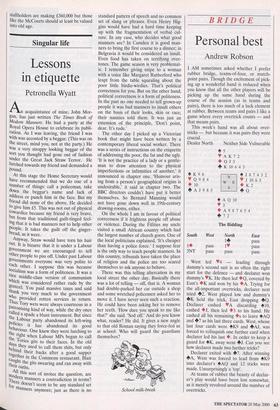Singular life
Lessons in etiquette
Petronella Wyatt
Ai acquaintance of mine, John Mor- gan, has just written The Times Book of Modern Manners. He had a party at the Royal Opera House to celebrate its publi- cation. As I was leaving, the friend I was with was accosted by a beggar. (This was on the street, mind you, not at the party.) He was a very stroppy looking beggar of the sort you thought had gone out of fashion under the Great Jack Straw Terror. He lurched towards my friend and demanded a pound.
At this stage the Home Secretary would have recommended that we do one of a number of things: call a policeman, take down the beggar's name and lack of address or punch him in the face. But my friend did none of the above. He decided to give him £5. This was not out of physical cowardice because my friend is very brave, but from that traditional guilt-tinged feel- ing that it is bad manners not to help other People. It takes the guilt off the ginger- bread, as it were.
Anyway, Straw would have torn his hair out. It is bizarre that it is under a Labour government we are encouraged to tell other people to piss off. Under past Labour governments everyone was very polite to each other. I suppose this was because socialism was a form of politeness. It was a nice middle-class version of communism which was considered rather rude by the genteel. You paid massive taxes and said thank you very much to the government who provided rotten services in return. Thus Tory wets were always courteous in a patronising kind of way, while the dry ones Called a spade a blunt instrument. But since the Labour party abandoned its left-wing policies it has abandoned its good behaviour. One knew they were lurching to the right when Labour MPs began to call tpe Tories gits to their faces. In the old ,daYs they used to call them shits, but only %hind their backs after a good supper together in the Commons restaurant. Blair caught the gits swearing and ran away with their oaths. All this sort of invites the question, are modern manners a contradiction in terms? ,l'ho ere doesn't seem to be any standard set for manners anymore; just as there is no standard pattern of speech and no common set of slang or phrases. Even Henry Hig- gins would have had a hard time keeping up with the fragmentation of verbal cul- ture. In any case, who decides what good manners are? In Camden it is good man- ners to bring the first course to a dinner; in Belgravia it would be considered an insult. Even food has taken on terrifying over- tones. The game season is very problemat- ic. I remember giving snipe to a woman with a voice like Margaret Rutherford who leapt from the table squealing about the poor little birdie-wirdies. That's political correctness for you. But on the other hand, political correctness is a form of politeness. In the past no one needed to tell grown-up people it was bad manners to insult others on the basis of their looks, skin or race; their nannies told them. It was just an extension of the principle, 'Don't point, dear. It's rude.'
The other day I picked up a Victorian book that might have been written by a contemporary liberal social worker. There was a series of instructions on the etiquette of addressing the poor, the fat and the ugly. `It is not the practice of a lady or a gentle- man to draw attention to the physical imperfections or infirmities of another,' it announced in chapter one. 'Humour aris- ing from a person's geographical origins is undesirable,' it said in chapter two. The BBC directors couldn't have put it better themselves. So Bernard Manning would not have gone down well in 19th-century drawing-rooms, either.
On the whole I am in favour of political correctness if it frightens people off abuse or violence. During the Fifities my uncle visited a small African country which had the largest number of church goers. One of the local politicians explained, 'It's cheaper than having a police force.' I suppose fear is the only way to teach people manners. In this country, tribunals have taken the place of religion and the police are too scared themselves to ask anyone to behave.
There was this telling altercation in my local street the other day. Basically there was a lot of telling — off, that is. A woman had double-parked her car outside a shop and some wretched policemen asked her to move it. I have never seen such a reaction. He could have been asking her to remove her teeth. 'How dare you speak to me like that?' she said. 'Sod off.' And do you know what, reader? He did. It gives a new angle to that old Roman saying they force-fed us at school: Who will guard the guardians themselves?
School milk-break









































































 Previous page
Previous page